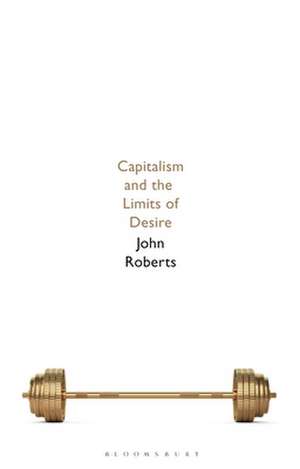Capitalism and the Limits of Desire
Autor John Robertsen Limba Engleză Paperback – 8 sep 2021
| Toate formatele și edițiile | Preț | Express |
|---|---|---|
| Paperback (1) | 159.53 lei 3-5 săpt. | +27.82 lei 10-14 zile |
| Bloomsbury Publishing – 8 sep 2021 | 159.53 lei 3-5 săpt. | +27.82 lei 10-14 zile |
| Hardback (1) | 374.07 lei 3-5 săpt. | +25.19 lei 10-14 zile |
| Bloomsbury Publishing – 8 sep 2021 | 374.07 lei 3-5 săpt. | +25.19 lei 10-14 zile |
Preț: 159.53 lei
Preț vechi: 173.36 lei
-8% Nou
Puncte Express: 239
Preț estimativ în valută:
30.53€ • 31.69$ • 25.46£
30.53€ • 31.69$ • 25.46£
Carte disponibilă
Livrare economică 01-15 martie
Livrare express 18-22 februarie pentru 37.81 lei
Preluare comenzi: 021 569.72.76
Specificații
ISBN-13: 9781350214958
ISBN-10: 1350214957
Pagini: 264
Dimensiuni: 138 x 216 x 19 mm
Greutate: 0.34 kg
Editura: Bloomsbury Publishing
Colecția Bloomsbury Academic
Locul publicării:London, United Kingdom
ISBN-10: 1350214957
Pagini: 264
Dimensiuni: 138 x 216 x 19 mm
Greutate: 0.34 kg
Editura: Bloomsbury Publishing
Colecția Bloomsbury Academic
Locul publicării:London, United Kingdom
Caracteristici
Timely - points to how marxism and political resistance has to change in a new, technologically dominated era
Notă biografică
John Roberts is Professor of Art and Aesthetics at the University of Wolverhampton, UK. He is author of The Intangibilities of Form: Skill and Deskilling in Art After the Readymade (2007), The Necessity of Errors (2010), Photography and Its Violations (2014), Revolutionary Time and the Avant-Garde (2015), Thoughts on an Index Not Freely Given (2016) and His The Reasoning of Unreason (Bloomsbury 2018) and co-editor of Boris Arvatov, Art and Production (2017)
Cuprins
prelimsacknowledgementsIntroduction:Chapter 1: Capitalism, jouissance and subjective ruinationChapter 2: Individuation, 'egoism' and social reproductionChapter 3: Self-love, jouissance and desireChapter 4: Perfectionism, individuation and self-realizationConclusionbibliographyindex
Recenzii
Why is challenging or overcoming capitalism such a difficult project when its economic, social, and environmental failures are abundantly clear? John Roberts proposes a unique answer, it is because capital has become part of our very conception of ourselves, our self-love.
John Roberts's Capitalism and the Limits of Desire intervenes at the very core of contemporary debates on the libidinal economy, insisting that we need to work through the complex nexus of economic logic and the production of enjoyment, if we want to effectively organise our resistance against the catastrophic tendencies of capitalism. Roberts also provides us with a much-needed orientation in the multiplicity of classical and contemporary takes on the function of enjoyment and affects in the reproduction of capitalism.
John Roberts's Capitalism and the Limits of Desire intervenes at the very core of contemporary debates on the libidinal economy, insisting that we need to work through the complex nexus of economic logic and the production of enjoyment, if we want to effectively organise our resistance against the catastrophic tendencies of capitalism. Roberts also provides us with a much-needed orientation in the multiplicity of classical and contemporary takes on the function of enjoyment and affects in the reproduction of capitalism.
